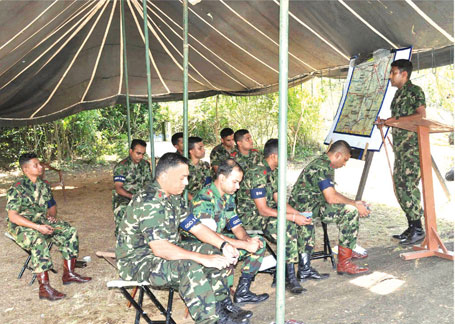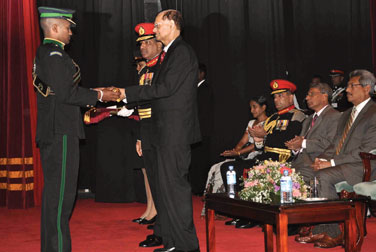Batalanda Staff College
All military doctrinal and strategic level planning
and teachings under one roof:
By Dhaneshi YATAWARA
 Located in a serene environment away from the hustle and bustle of
the metropolitan city, Batalanda Defence Services and Staff College
brings out the best of every officer who enters the institute. As of
today this is the most prestigious and the highest seat of learning of
military education in Sri Lanka. Located in a serene environment away from the hustle and bustle of
the metropolitan city, Batalanda Defence Services and Staff College
brings out the best of every officer who enters the institute. As of
today this is the most prestigious and the highest seat of learning of
military education in Sri Lanka.
Established initially to fine-tune the knowledge and personality of
officers both in command and staff of the Army today it has expanded its
service to all three forces from 2007. The inception of this
organisation was the Army Command and Staff College that was inaugurated
in mid 1998.
The college was officially inaugurated by the then President
Chandrika Bandaranaike Kumaratunga on a request made by the then Army
Commander Lieutenant General Rohan Daluwatte. The first course was
consisted of only 26 students from the Army.
With the height of the war a heavy demand was created among all three
forces to strengthen the middle level command - both in and out of the
field. Thus there was a need to create a joint services atmosphere
within the College.
Since day one the institute was training few selected officers from
the Sri Lanka Navy and the Air Force yet there was a need to increase
the number.
In this backdrop the institute changed its atmosphere and was named
the Defence Services Command and Staff College, as it is known now.
The change took place in 2007. On January 22 marking an important
milestone in the history of the Sri Lankan Armed Forces, the Defence
Services Command and Staff College (DSCSC) was inaugurated at a very
simple yet formal event graced by Secretary to the President Lalith
Weeratunga as its chief guest. With this, all military doctrinal and
strategic level planning and teachings were brought under one roof as
practised by many other armed forces of the world.
|

Awards ceremony held last year |
Today Major General Rambukpotha serves as the second Commandant of
the DSCSC. "The aim of the DSCSC is to develop the professional
knowledge and understanding of selected officers from the tri-Services
and other public institutions in order to prepare them to the middle
level ranks, both in command and staff and to impart knowledge on
government procedures to other public sector officers," said Deputy
Commandant Brigadier Lakshman David. During the eleven and a half months
student officers undergo a heavy load of studies and training not only
on military and warfare matters but on international humanitarian law,
military aid to civil authorities, international affairs, management
studies etc, according to Bgrd. David. "Students also can go up to
achieve their Masters Degree (Master of Defence Studies) from the
University of Kelaniya depending on the marks they received for their
thesis on the research work. The course philosophy runs on a balance
between education and training. For these officers a sensible balance
between theoretical knowledge and the learning and practice of specific
transferable skills gained through training is important. This is
important as it attributes to cope with their future appointments and
the challenges that are inevitable in the years ahead.
By this process the officers get a chance to develop their breadth of
understanding and the ability to analyse and evaluate issues in a
logical way.
At the very inception of the college in 1998, emphasising on our own
requirements the syllabus was formulated with the assistance from a
training team from the British Army headed by two Lieutenant Colonels.
Skills
The British team has extended a valuable service to the College by
providing required training material and fine tuning the skills of the
teaching staff giving an on the job training.
Today the DSCSC is fully equipped with an excellent teaching staff
who are more preferably called as directing staff.
They lead, guide and direct the training officer to a better path
making his inbuilt talents emerge to the surface. "Instructions at the
staff college is based upon syndicate or tutorial system. This provides
an excellent way of allowing student officers to learn from each others
experience," said Chief Instructor for the Army Brigadier Sathyapriya
Liyanage. A large part of students' work is covered in this environment.
A syndicate has only twelve to thirteen students with ten Army officers
and others from the Navy and the Air Force.
In order to mix the exposure, syndicates are changed at every term
thus a student gets a chance to be in different groups with different
fellow students. The training consists of indoor exercises, outdoor
exercises.
"The officer trained here needs to build up his endurance levels
too," said Chief Instructor for the Navy, Commodore Jayantha de Silva.
Course
"This officer in his future appointments will have to face long
working hours, endless nights, and tension at any moment. With all that
he has to have a balanced mind being responsible for all actions of his
men," Commander de Silva added.
"There is a vast improvement in a student when he completes the
course compared to his start," said Air Commodore Sagara Kotakadeniya,
the Chief Instructor for the Air Force.
"They are exposed to different experts from different fields such as
human rights, civil administration and management.
This provides a strong base for the student officers in a broad
spectrum of subjects," he added.
A wide range of eminent speakers address the students during the
course. Student officers visit the Parliament, Survey Department, Board
of Investments, Port Authority, Bandaranaike International Airport.
"This is to provide them with a sound understanding of the operational
aspect of these organizations which they may need at any moment - for
example to provide security at a special situation," the instructors
explained.
Exchange
In addition, officers from Armed Forces of Foreign countries
attending the course as students also give a greater chance to exchange
their ideas on unique experiences of each country.
At present there are eight student officers from India, Pakistan,
Bangladesh, Nepal, Maldives, China and Sudan studying in the course.
Teams of students are also embarked on a 10-day overseas study tour
to a SAARC or an ASEAN country.
In addition to all these it is compulsory for student officers to
keep their physical fitness at high levels and they have to qualify in
the Staff College physical efficiency test, each term.
In order to keep them in touch with their families many events are
conducted with the participation of their families. Specially the Ladies
Club, that is formed by wives of the student officers provide a chance
for these ladies and children to feel the team spirit and making them
understand they are not alone in their highly committed dedicated
lifestyles.
Appearance
During the nine years of the first institute - the Army Command and
Staff College - totally 253 Army, Navy and Air Force officers have
passed out.
After the change of appearance in 2007 the total number of students
passed out was 228 which include officers from the Army, Navy, Air
Force, Police and Sri Lanka Administrative Service and foreign students.
The College, with its recent developments in infrastructure hopes to
accommodate 100 student officers by next year. This year including the
foreign officers a total of 83 officers studied.
The Ministry of Defence have invited 16 friendly countries, such as
the USA, Australia, China, South Korea, Pakistan, Malaysia and
Bangladesh to send their officers for the next batches.
With a historical victory gained over terrorism fighting with a
guerrilla force, Sri Lanka today holds a unique place in the defence
field and changes of the DSCSC could be nothing but the best example for
this. |

